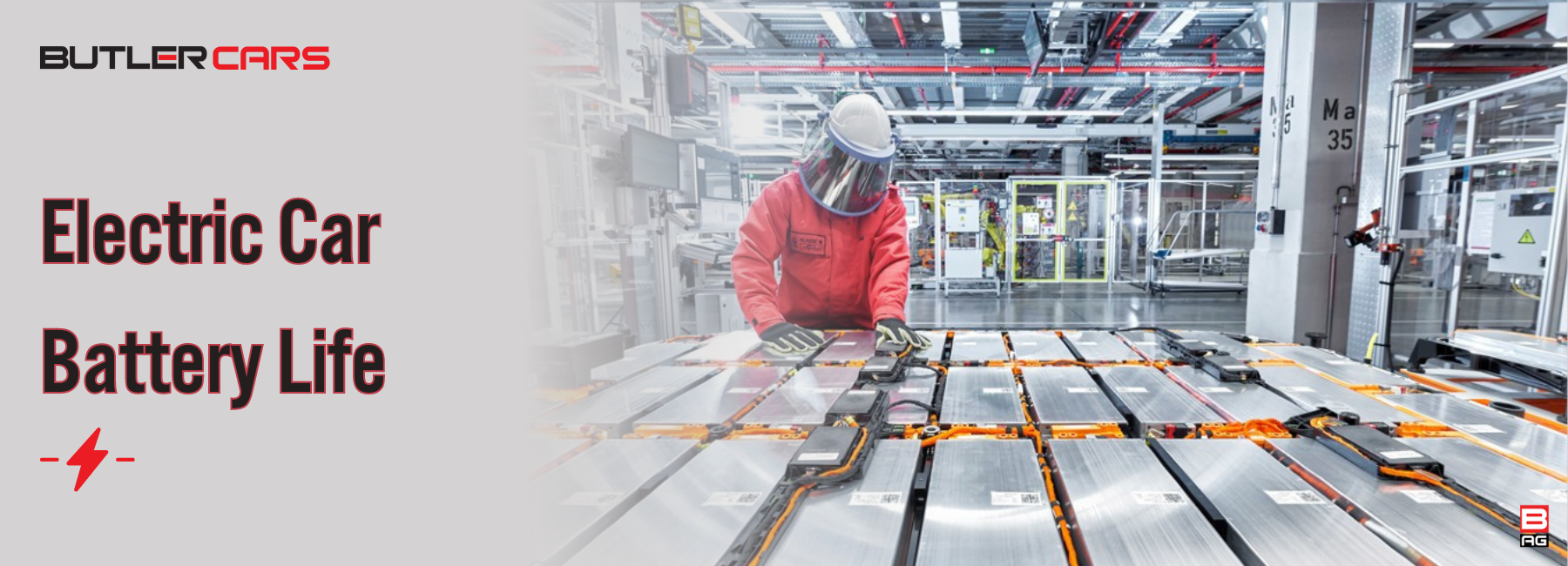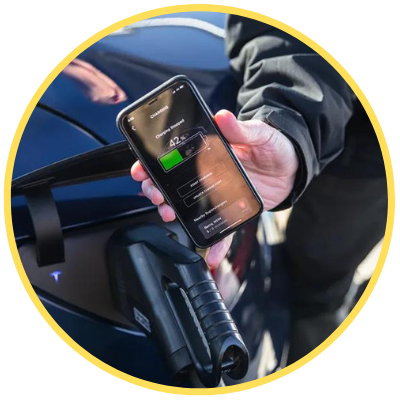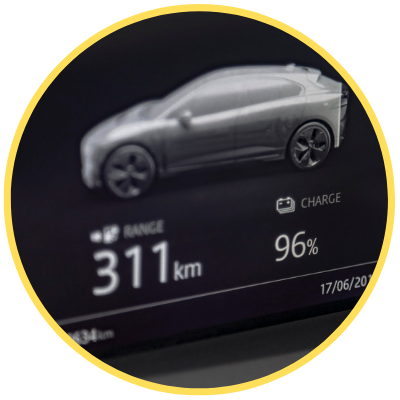Electric Car Battery Life

How Are Electric Car Batteries Made?
 The vast majority of modern EV batteries are lithium-ion. Do you remember hearing that term before? That’s probably because lithium-ion is an essential technology that’s also used in many of your favorite electronic devices including tablets, smartphones, and laptops. Due to recent breakthroughs in lithium-ion battery technology in the past two decades, automakers have begun to push the limits of both capacity and charging capabilities. Several of the first mainstream electric vehicles had ranges limited to between 50 and 75 miles. Today, most EVs can travel between 200 and 300 miles with ease. Engineers remain hard at work at pushing the limits of battery technology to increase range further than ever before.
The vast majority of modern EV batteries are lithium-ion. Do you remember hearing that term before? That’s probably because lithium-ion is an essential technology that’s also used in many of your favorite electronic devices including tablets, smartphones, and laptops. Due to recent breakthroughs in lithium-ion battery technology in the past two decades, automakers have begun to push the limits of both capacity and charging capabilities. Several of the first mainstream electric vehicles had ranges limited to between 50 and 75 miles. Today, most EVs can travel between 200 and 300 miles with ease. Engineers remain hard at work at pushing the limits of battery technology to increase range further than ever before.
Electric Car Battery Life
 Electric car batteries are built using robust construction to last years. However, they will degrade over time and through regular usage. Most experts estimate that an EV battery will lose about 2.3 percent of its initial range each year on average. Federal law mandates that manufacturers cover their batteries with at least 8 years or 100,000 miles of warranty, whichever comes first.In general, the average electric car battery life is approximately 10 years before a replacement is required. Since that’s much longer than most people keep a new car on average, it’s not a concern for the majority of new car buyers. Even if you expect to keep your EV for the long-haul, you can drive with total confidence knowing that your battery is covered by a robust warranty in the event that you experience an issue.
Electric car batteries are built using robust construction to last years. However, they will degrade over time and through regular usage. Most experts estimate that an EV battery will lose about 2.3 percent of its initial range each year on average. Federal law mandates that manufacturers cover their batteries with at least 8 years or 100,000 miles of warranty, whichever comes first.In general, the average electric car battery life is approximately 10 years before a replacement is required. Since that’s much longer than most people keep a new car on average, it’s not a concern for the majority of new car buyers. Even if you expect to keep your EV for the long-haul, you can drive with total confidence knowing that your battery is covered by a robust warranty in the event that you experience an issue.
Tips for Maximizing EV Battery Life
 While battery degradation is totally normal and will naturally occur through normal driving conditions, there are a number of steps you can take to extend the life of your battery. In order to avoid excessive wear on the battery, don’t leave your car sitting fully charged or at low levels for extended stretches of time. It’s something to consider if you’re working remotely or taking an extended vacation.Although DC fast charging stations offer tremendous convenience when you need them, they are known to degrade your battery if used frequently. If you’re able to charge normally at your home or office, it’s best to use fast charging stations only when necessary. Finally, extreme temperatures can be a culprit in degrading battery life as well. Parking indoors during the winter or in the shade during the summer months can help minimize harmful wear on your battery.
While battery degradation is totally normal and will naturally occur through normal driving conditions, there are a number of steps you can take to extend the life of your battery. In order to avoid excessive wear on the battery, don’t leave your car sitting fully charged or at low levels for extended stretches of time. It’s something to consider if you’re working remotely or taking an extended vacation.Although DC fast charging stations offer tremendous convenience when you need them, they are known to degrade your battery if used frequently. If you’re able to charge normally at your home or office, it’s best to use fast charging stations only when necessary. Finally, extreme temperatures can be a culprit in degrading battery life as well. Parking indoors during the winter or in the shade during the summer months can help minimize harmful wear on your battery.
 The vast majority of modern EV batteries are lithium-ion. Do you remember hearing that term before? That’s probably because lithium-ion is an essential technology that’s also used in many of your favorite electronic devices including tablets, smartphones, and laptops. Due to recent breakthroughs in lithium-ion battery technology in the past two decades, automakers have begun to push the limits of both capacity and charging capabilities. Several of the first mainstream electric vehicles had ranges limited to between 50 and 75 miles. Today, most EVs can travel between 200 and 300 miles with ease. Engineers remain hard at work at pushing the limits of battery technology to increase range further than ever before.
The vast majority of modern EV batteries are lithium-ion. Do you remember hearing that term before? That’s probably because lithium-ion is an essential technology that’s also used in many of your favorite electronic devices including tablets, smartphones, and laptops. Due to recent breakthroughs in lithium-ion battery technology in the past two decades, automakers have begun to push the limits of both capacity and charging capabilities. Several of the first mainstream electric vehicles had ranges limited to between 50 and 75 miles. Today, most EVs can travel between 200 and 300 miles with ease. Engineers remain hard at work at pushing the limits of battery technology to increase range further than ever before. Electric Car Battery Life
 Electric car batteries are built using robust construction to last years. However, they will degrade over time and through regular usage. Most experts estimate that an EV battery will lose about 2.3 percent of its initial range each year on average. Federal law mandates that manufacturers cover their batteries with at least 8 years or 100,000 miles of warranty, whichever comes first.In general, the average electric car battery life is approximately 10 years before a replacement is required. Since that’s much longer than most people keep a new car on average, it’s not a concern for the majority of new car buyers. Even if you expect to keep your EV for the long-haul, you can drive with total confidence knowing that your battery is covered by a robust warranty in the event that you experience an issue.
Electric car batteries are built using robust construction to last years. However, they will degrade over time and through regular usage. Most experts estimate that an EV battery will lose about 2.3 percent of its initial range each year on average. Federal law mandates that manufacturers cover their batteries with at least 8 years or 100,000 miles of warranty, whichever comes first.In general, the average electric car battery life is approximately 10 years before a replacement is required. Since that’s much longer than most people keep a new car on average, it’s not a concern for the majority of new car buyers. Even if you expect to keep your EV for the long-haul, you can drive with total confidence knowing that your battery is covered by a robust warranty in the event that you experience an issue.Tips for Maximizing EV Battery Life
 While battery degradation is totally normal and will naturally occur through normal driving conditions, there are a number of steps you can take to extend the life of your battery. In order to avoid excessive wear on the battery, don’t leave your car sitting fully charged or at low levels for extended stretches of time. It’s something to consider if you’re working remotely or taking an extended vacation.Although DC fast charging stations offer tremendous convenience when you need them, they are known to degrade your battery if used frequently. If you’re able to charge normally at your home or office, it’s best to use fast charging stations only when necessary. Finally, extreme temperatures can be a culprit in degrading battery life as well. Parking indoors during the winter or in the shade during the summer months can help minimize harmful wear on your battery.
While battery degradation is totally normal and will naturally occur through normal driving conditions, there are a number of steps you can take to extend the life of your battery. In order to avoid excessive wear on the battery, don’t leave your car sitting fully charged or at low levels for extended stretches of time. It’s something to consider if you’re working remotely or taking an extended vacation.Although DC fast charging stations offer tremendous convenience when you need them, they are known to degrade your battery if used frequently. If you’re able to charge normally at your home or office, it’s best to use fast charging stations only when necessary. Finally, extreme temperatures can be a culprit in degrading battery life as well. Parking indoors during the winter or in the shade during the summer months can help minimize harmful wear on your battery.
